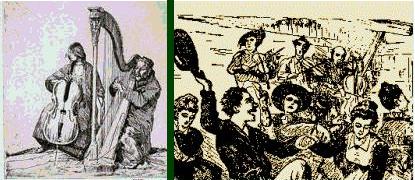Who out there has some so-called music "theory" study or training? By that, I mean (a) how to form the different types of chords, (b) inversions, (c) how to read figured bass, (d) doubling rules in 4-part harmony, (e) types of motion, (f) voice leading, (g) what chords most easily follow what other chords, (h) the types of non-harmonic tones and how they are used, (i) ways to modulate..., y'know, fun stuff like that.
My high school band teacher brought someone in to teach us that stuff for a few sessions each year. I loved it and so it really struck a chord, so to speak, with me. I could often be caught studying the conductor's scores whenever I had the chance. I learned to read all the different transpositions. What really intrigued me were scores or parts of scores that ignored the "rules". How did they know it would work? It seemed like magic. Of course, now that I'm much older and presumably wiser I know for sure that it really is magic.
I get the feeling most adult beginners and even most child beginners don't get enough instruction in that stuff. Isn't there more to playing an instrument than putting finger X on spot Y to get note Z, just because that's what's on the paper?
Or maybe it's just me and it's not that important for most instrumentalist folks.
Reposted from CBN, below are links to written music and midis for God Rest Ye Merry Gentleman with two different accompaniments. While both accompaniments are for the same tune, the two accompaniments are not at all compatible!
The first accompaniment is the traditional bass line sung by bass voices or played on piano since who-knows-when. It conforms to the collection of rules practiced during the Common-Practice Era, ie, the kind of rules one learns in "theory" class. No parallel fifths or octaves, no 2nd inversions except under special circumstances, no doubling the 3rd except under special circumstances...
The second accompaniment, mostly in double stops, ignores some of those rules. Mr. K would have given it a big ol' F! Make that F minus! There's nothing like telling a kid he can't do something to make him do it (35 years later, even!).
I've prepared two midis, one with the traditional bass accompaniment and one with my own thing.
PDF of all 3 parts
MIDI with CPE-stype bass
MIDI with non-CPE bass
PS: I decided this cryptic post was necessary to set-up for Chapter 4, so that's why it's here.

Old World or New, Sacred or Profane
Subscribe to:
Post Comments (Atom)
3 comments:
I was really thrilled to learn about modes from a substitute tutor at our teaching orchestra. I had never learned anything about them, other than in a passing research kind of way in the 12 yeears or so I studied music before.
Those links don't work any more
Thhis was a lovely blog post
Post a Comment